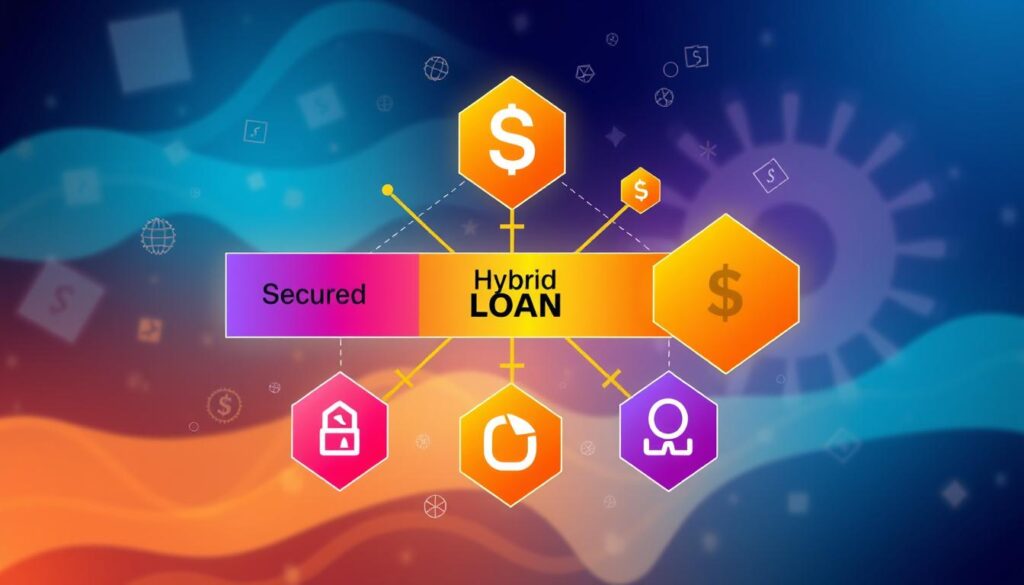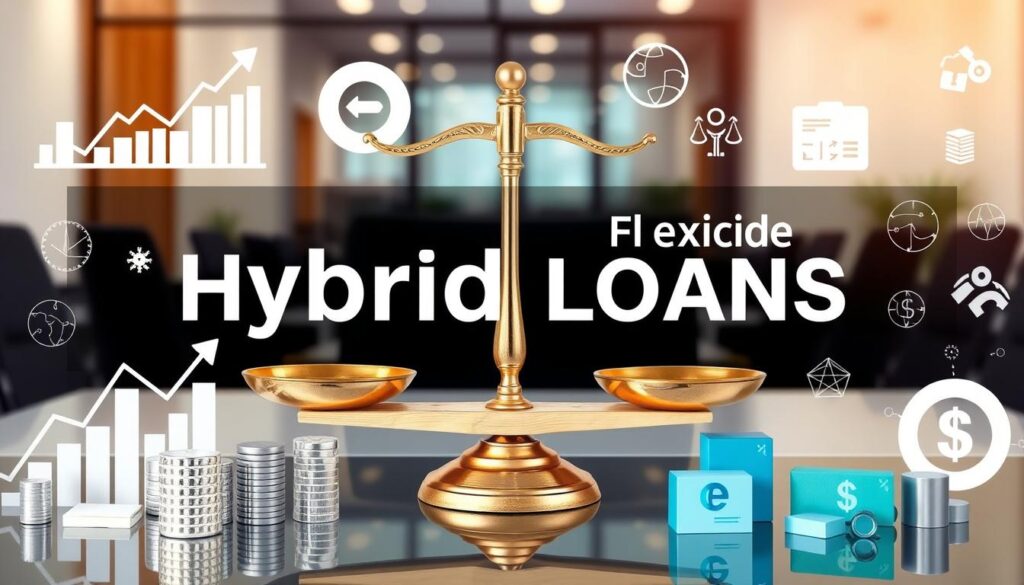We offer expert advice to help small business owners and entrepreneurs. We explain hybrid loans and how they can grow your business. A hybrid loan mixes different loan features, giving unique benefits. Knowing about hybrid loans helps businesses choose the right financing.
We aim to guide business owners through the complex world of financing. We explain hybrid loans to help them make smart financial choices. Our goal is to give clear, unbiased information for confident decisions.
Understanding hybrid loans can help businesses decide if they’re right. We’ll cover the benefits, types, and how to apply. This knowledge helps businesses make informed choices.
Key Takeaways
- Hybrid loans combine different loan aspects for unique benefits.
- Knowing about hybrid loans helps businesses choose the right financing.
- Hybrid loans can fuel business growth and offer financing options.
- We provide clear, unbiased information for confident decisions.
- Understanding hybrid loans helps businesses decide if they’re right.
- Hybrid loans offer flexibility and accessible financing options.
Understanding Hybrid Loans
Hybrid loans are a special kind of financing that blends different loan types. They offer businesses a flexible way to handle their money. The main perk of hybrid business loans is they can be tailored to fit a business’s exact needs.
It’s key to know what makes hybrid loans stand out. They mix the good parts of fixed-rate and variable-rate loans. This helps businesses manage their money better and reduce risks. Some key features of hybrid loans are:
- Flexible repayment terms
- Customizable loan structures
- Competitive interest rates
Hybrid loans are different because they can be adjusted to fit a business’s changing needs. By understanding what hybrid loans are and what they offer, businesses can make smart choices about their money. This helps them pick the right loan for their situation.
Exploring hybrid loans shows they have many benefits for businesses. They offer flexible payments and competitive rates. Hybrid loans are a unique way to finance a business, helping it grow and succeed. Whether you run a small business or are an entrepreneur, knowing about hybrid loans can help you make better financial choices.
Benefits of Hybrid Loans for Businesses
Hybrid loans are great for small businesses and entrepreneurs. They offer flexible payment plans. This helps businesses manage their money better and pay back the loan easier.
Hybrid loans also make it easier for small businesses to get the money they need. This is good for businesses that can’t get loans from banks.
Some key benefits of hybrid loans are:
- Flexibility in repayment terms
- Accessible financing options for small businesses
- Potential tax benefits, such as deducting interest payments
Using hybrid loans can help businesses stay financially stable. They can get the money needed to grow, like expanding or hiring more people. With the right loan, businesses can do well in a tough market.
Hybrid loans are a good choice for businesses. They offer many benefits that help businesses reach their financial goals. By understanding these benefits, businesses can pick the best loan for them.
Types of Hybrid Loans Available
Hybrid loans come in various forms for businesses. Each has its own features. It’s key to know the hybrid loan structure, terms, and rates.
Hybrid loans can be customized to fit a business’s needs. They offer flexible payments and financing options. The terms and rates vary based on the loan type, such as fixed-rate, variable-rate, or combination loans.
Fixed-Rate Hybrid Loans
Fixed-rate hybrid loans have a fixed interest rate for the loan’s life. This means predictable payments and a stable hybrid loan structure. It’s great for businesses that want to avoid variable rate risks.
Variable-Rate Hybrid Loans
Variable-rate hybrid loans have an interest rate that can change. This loan offers payment flexibility but also carries the risk of rising rates.

Combination Loans
Combination loans mix fixed-rate and variable-rate features. They offer a balance of stability and flexibility. This loan is good for businesses looking to manage risks and benefits.
When picking a hybrid loan, consider the terms, rates, and structure. Knowing the different hybrid loans helps businesses make smart financing choices. They can pick the loan that suits their needs best.
Who Can Benefit from Hybrid Loans?
Hybrid financing is a big help for many small businesses. It’s great for startups, small businesses, and even big companies. It’s also good for franchises and retail shops.
These businesses often struggle with money. They might need to manage cash flow, grow, or buy new tech. Hybrid loans offer the money they need to get past these problems. For example, a new business might use it for start-up costs. An older company might use it for a big growth project.
Startups and Small Businesses
Startups and small businesses find hybrid loans helpful. They offer flexible payments and easy access to money. This helps these businesses grow and develop.
- Flexible repayment schedules
- Lower interest rates compared to traditional loans
- Opportunity to build creditworthiness
Established Companies Looking to Expand
Big companies wanting to grow can also use hybrid loans. They get the money needed for new stuff, more staff, or to enter new markets. It’s a good choice when they’re ready to grow and meet their financial goals.
In short, hybrid loans are a great option for many businesses. Knowing when to use them can help business owners plan their financial future wisely.
| Business Type | Benefits of Hybrid Loans |
|---|---|
| Startups and Small Businesses | Flexible repayment terms, accessible financing options |
| Established Companies | Funds for expansion, equipment, and hiring |
| Franchises and Retail Operations | Financing for new locations, marketing, and inventory |
How to Apply for a Hybrid Loan
Getting a hybrid loan needs careful planning and focus. First, look at the loan terms and rates from different lenders. This helps you find the best fit for your business. It’s also key to know how a hybrid loan compares to a traditional one for your finances.
A solid business plan is essential. It should have good financial forecasts, a clear business description, and a plan for the loan use. A good credit score is also important. It can affect the loan terms and rates you get.
Preparing Your Business Plan
To boost your approval chances, make a detailed business plan. It should show your company’s growth and repayment ability. Include these important parts:
- Executive summary
- Company description
- Market analysis
- Financial projections
Required Documentation
You’ll also need to gather documents for your application. These include:
- Financial statements
- Tax returns
- Collateral documentation (if applicable)
With a well-prepared business plan and documents, you can confidently apply for a hybrid loan. This way, you can get the best loan terms and rates for your business. Always compare hybrid and traditional loans to choose wisely for your goals.
Factors to Consider Before Choosing a Hybrid Loan
When looking at hybrid loan options, it’s key to think about several important factors. These factors can greatly affect your business’s financial health. We’ll offer expert advice to help you understand hybrid loans better.
Hybrid loans mix different loan types, giving you flexible payments and financing. But, interest rates and terms can change a lot. It’s important to consider these factors to choose the best loan for your business.
Interest Rates and Terms
Hybrid loan rates and terms can change, so it’s important to read the loan agreement well. Look for lenders with good rates and flexible terms. A loan with a lower rate can save your business a lot of money in interest.
Loan Amounts and Repayment Periods
The loan amount and how long you have to pay it back also matter. Think about how much money you need and how long you can take to pay it back. A longer time to pay might mean smaller monthly payments, but you’ll pay more interest overall.

By carefully looking at these factors and thinking about your business’s needs, you can find a hybrid loan that helps you grow. Always check the loan’s structure and terms before deciding. And don’t be afraid to ask for expert advice if you need it.
Risks Associated with Hybrid Loans
When you look at hybrid loans versus traditional loans, it’s key to know the risks. Hybrid loans can help small businesses, but it’s important to see the downsides. One big worry is the change in interest rates, which can change the loan’s cost.
Another risk is managing debt. Hybrid loans mix different loan types, making debt hard to handle. It’s important to read the loan terms well to know how to pay back. For more on debt management, check out this resource on fixed and variable loans.
Some important things to think about with hybrid loans include:
- Interest rate terms
- Repayment schedules
- Fees and charges linked to the loan
By looking at these points and understanding the risks, you can decide if a hybrid loan is good for your business. It’s vital to balance the benefits of hybrid loans for small businesses with the risks to choose wisely for your company’s money needs.
Comparing Hybrid Loans to Traditional Loans
Businesses have many financing options, like hybrid loans and traditional loans. Knowing the differences between them is key for business owners. A comparison shows how each type affects a company’s finances differently.
Hybrid loans offer flexible repayment and lower interest rates. Traditional loans have fixed rates and clear repayment plans. Business owners need to consider these points to choose wisely.
Differences in Structure and Terms
Hybrid loans mix different loan types, like fixed and variable rates. This creates a tailored financing solution. Traditional loans, on the other hand, have a standard repayment plan and fixed interest rate.
Pros and Cons of Each Option
When choosing between hybrid and traditional loans, consider these factors:
- Flexibility in repayment terms
- Interest rates and fees
- Loan amounts and repayment periods
- Business creditworthiness requirements
By looking at these points, business owners can make smart choices. They can pick the best loan for their business needs.
Real-World Examples of Hybrid Loans
Hybrid financing can change the game for small businesses. It combines the best of debt and equity financing. The right time to get a hybrid loan depends on the business’s finances, growth plans, and industry. Let’s explore some real-world examples.
A small business might use a hybrid loan to grow. This loan gives the funds needed for expansion while keeping debt risk low. Franchises might choose a hybrid loan for their operations. It offers flexibility and easy access to funds.
Case Study: A Small Business Success
A small retail business wanted to grow. It chose a hybrid loan for the funds. The business repaid the loan with cash flows and equity. This shows how hybrid financing can help small businesses grow.
Example: A Franchise Expansion
A franchise wanted to grow and chose a hybrid loan. The loan had a flexible repayment plan. This helped the franchise manage its money well. It shows how hybrid loans can help franchises grow safely.
In conclusion, hybrid loans are great for small businesses and franchises. Knowing when to use them can help businesses grow. It’s all about making smart financing choices.
| Hybrid Loan Type | Benefits | Risks |
|---|---|---|
| Debt-Equity Hybrid Loan | Flexibility in repayment, access to capital | Risk of debt, possible equity dilution |
| Asset-Based Hybrid Loan | Use of assets as collateral, access to capital | Risk of asset loss, high interest rates |

How Hybrid Loans Can Fuel Business Growth
Hybrid loans give businesses a chance to grow and expand. They offer the funds needed to innovate and stay competitive. The flexible payment options make them appealing for businesses with changing cash flows.
Hybrid loans are great for investing in new ideas. This can mean buying new tech, hiring more staff, or entering new markets. By using these loans, businesses can grow and become more profitable. Here are some ways hybrid loans help:
- Expanding market reach through strategic marketing campaigns
- Developing new products or services to meet changing customer needs
- Improving operational efficiency through investments in technology and infrastructure
Experts say hybrid loans are a smart choice for growth. As financial experts point out, “hybrid loans offer flexibility and affordability. They’re perfect for businesses with big ambitions.” Knowing the benefits of hybrid loans helps businesses make smart financing choices and achieve success.
Frequently Asked Questions about Hybrid Loans
Businesses often wonder about hybrid loans when looking at financing options. We’ll answer common questions about hybrid loan terms and rates. We’ll also compare them to traditional loans.
Understanding hybrid loan options is key. They usually have more flexible repayment plans than traditional loans. This is great for businesses with changing cash flows.
What are the typical terms for a hybrid loan?
Hybrid loan terms vary by lender and loan type. They often mix fixed and variable interest rates. This can help businesses save money during certain times. The hybrid loan vs traditional loan debate focuses on flexibility and cost savings.
How does one determine eligibility?
To check if you’re eligible for a hybrid loan, look at your financials and credit history. Lenders will review these to see if you can repay the loan. Knowing the hybrid loan terms and rates helps businesses make smart financing choices.
By considering these points, businesses can pick the right financing. This means choosing between hybrid loan vs traditional loan options based on their needs.
Conclusion: Is a Hybrid Loan Right for Your Business?
Hybrid loans can be a great choice for businesses of all sizes. They offer flexible capital, whether you’re a startup or an established company. Thinking about a hybrid loan could open up new growth opportunities for you.
Assessing Your Financial Needs
Before choosing a hybrid loan, understand your business’s financial needs. Look at your current cash flow, future investments, and long-term goals. This will help you find the right loan amount, repayment terms, and features for your business.
Making an Informed Decision
After knowing your financial needs, look into different hybrid loan providers. Check their interest rates, fees, and tax benefits. Also, think about the loan’s flexibility and how it fits into your debt management plan.
By carefully considering the pros and cons, you can make a smart choice. The right hybrid loan can help you innovate, grow your market, and reach new heights in your business.
FAQ
What are the typical terms for a hybrid loan?
Hybrid loans mix fixed and variable interest rates. They let you change the loan over time. The details, like rates, repayment periods, and loan amounts, depend on the lender and your credit.
It’s key to understand the loan terms well. This includes knowing the risks of rate changes.
How does one determine eligibility for a hybrid loan?
To get a hybrid loan, you need good credit and a profitable business. Your cash flow, collateral, and financial health also matter. Lenders look at your industry, business size, and growth too.
Make sure you meet the lender’s criteria. This ensures you qualify for the loan.

